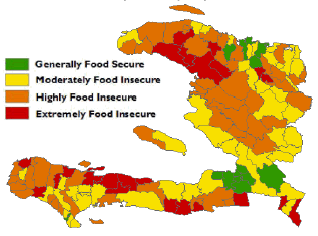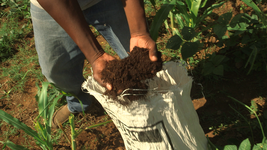Too many have no food.

Haiti has one of the highest levels of food insecurity in the world. According to a new Integrated Food Security Phase Classification (IPC) analysis, more than one in three people need urgent food assistance -- that is nearly 3.7 million people
Despite its large agricultural sector, Haiti currently does not produce enough food to feed its population. More than 50 percent of the country's overall food needs, and close to 80 percent of its main staple, rice, are imported. Thus Haitians are forced to rely on imports from other countries. This creates vulnerability for Haitians.
The main cause of food insecurity is household poverty. The agriculture sector, which provides 40% of income in rural areas, is declining and only generates 25% of GDP. ... The development of Haiti's agriculture sector faces many difficulties, including a lack of access to financing, technologies, advice and training.
Despite its large agricultural sector, Haiti currently does not produce enough food to feed its population. More than 50 percent of the country's overall food needs, and close to 80 percent of its main staple, rice, are imported. Thus Haitians are forced to rely on imports from other countries. This creates vulnerability for Haitians.
The main cause of food insecurity is household poverty. The agriculture sector, which provides 40% of income in rural areas, is declining and only generates 25% of GDP. ... The development of Haiti's agriculture sector faces many difficulties, including a lack of access to financing, technologies, advice and training.
How does Clean Challenge help?

Clean Challenge helps in three ways: resources, technology, and expertise. We are building a facility in Haiti where trash will be taken and separated into organic and non-organic matter. Organic matter can be composted, and that compost can then be added to soil to enhance its growing capacity. We are educating and transferring knowledge and resources to our Haitian partners so that wide scale composting can take place efficiently and effectively. Our goal is to empower local farmers and other growers in building a more robust and sustainable food supply.
